CHEVROLET KODIAK 2007 Owners Manual
Manufacturer: CHEVROLET, Model Year: 2007, Model line: KODIAK, Model: CHEVROLET KODIAK 2007Pages: 430, PDF Size: 6.06 MB
Page 151 of 430
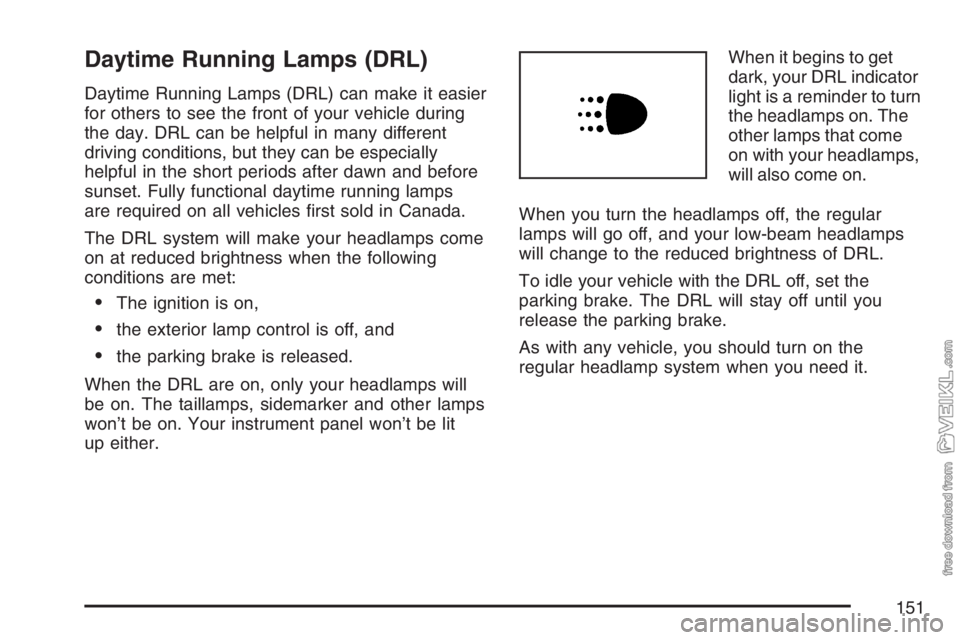
Daytime Running Lamps (DRL)
Daytime Running Lamps (DRL) can make it easier
for others to see the front of your vehicle during
the day. DRL can be helpful in many different
driving conditions, but they can be especially
helpful in the short periods after dawn and before
sunset. Fully functional daytime running lamps
are required on all vehicles first sold in Canada.
The DRL system will make your headlamps come
on at reduced brightness when the following
conditions are met:
•The ignition is on,
•the exterior lamp control is off, and
•the parking brake is released.
When the DRL are on, only your headlamps will
be on. The taillamps, sidemarker and other lamps
won’t be on. Your instrument panel won’t be lit
up either.When it begins to get
dark, your DRL indicator
light is a reminder to turn
the headlamps on. The
other lamps that come
on with your headlamps,
will also come on.
When you turn the headlamps off, the regular
lamps will go off, and your low-beam headlamps
will change to the reduced brightness of DRL.
To idle your vehicle with the DRL off, set the
parking brake. The DRL will stay off until you
release the parking brake.
As with any vehicle, you should turn on the
regular headlamp system when you need it.
151
Page 152 of 430
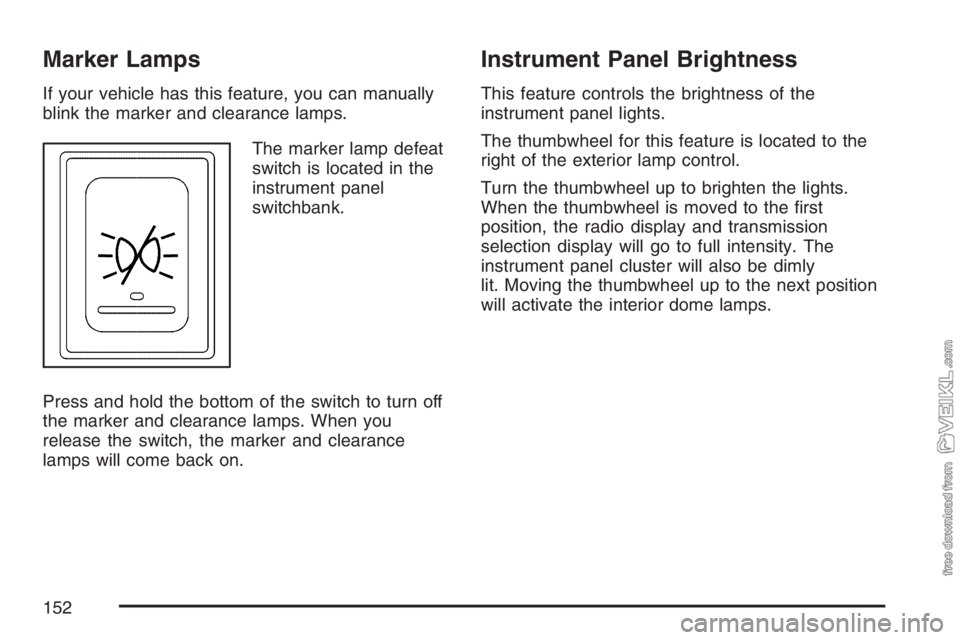
Marker Lamps
If your vehicle has this feature, you can manually
blink the marker and clearance lamps.
The marker lamp defeat
switch is located in the
instrument panel
switchbank.
Press and hold the bottom of the switch to turn off
the marker and clearance lamps. When you
release the switch, the marker and clearance
lamps will come back on.
Instrument Panel Brightness
This feature controls the brightness of the
instrument panel lights.
The thumbwheel for this feature is located to the
right of the exterior lamp control.
Turn the thumbwheel up to brighten the lights.
When the thumbwheel is moved to the first
position, the radio display and transmission
selection display will go to full intensity. The
instrument panel cluster will also be dimly
lit. Moving the thumbwheel up to the next position
will activate the interior dome lamps.
152
Page 153 of 430
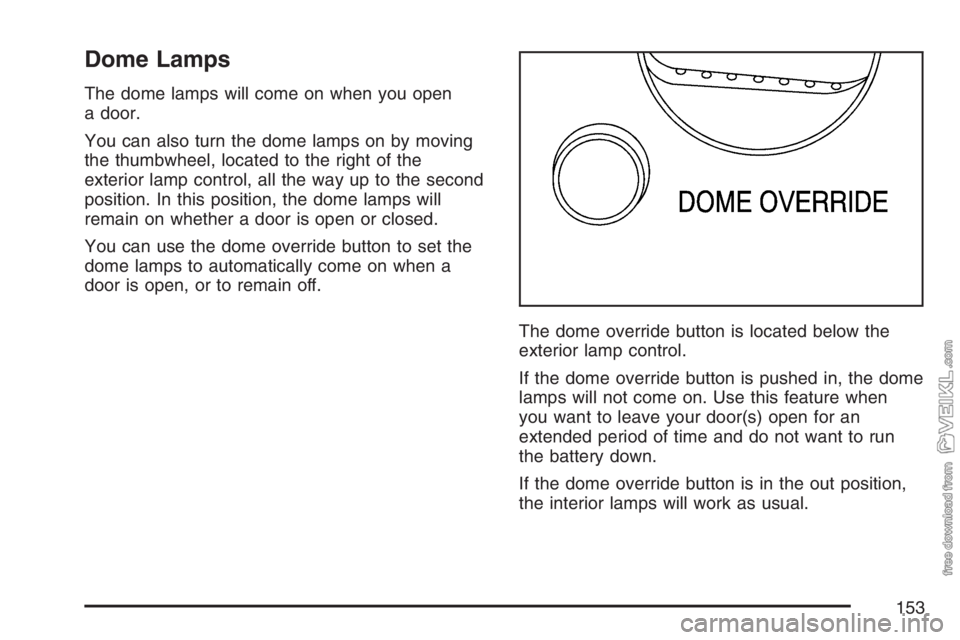
Dome Lamps
The dome lamps will come on when you open
a door.
You can also turn the dome lamps on by moving
the thumbwheel, located to the right of the
exterior lamp control, all the way up to the second
position. In this position, the dome lamps will
remain on whether a door is open or closed.
You can use the dome override button to set the
dome lamps to automatically come on when a
door is open, or to remain off.
The dome override button is located below the
exterior lamp control.
If the dome override button is pushed in, the dome
lamps will not come on. Use this feature when
you want to leave your door(s) open for an
extended period of time and do not want to run
the battery down.
If the dome override button is in the out position,
the interior lamps will work as usual.
153
Page 154 of 430
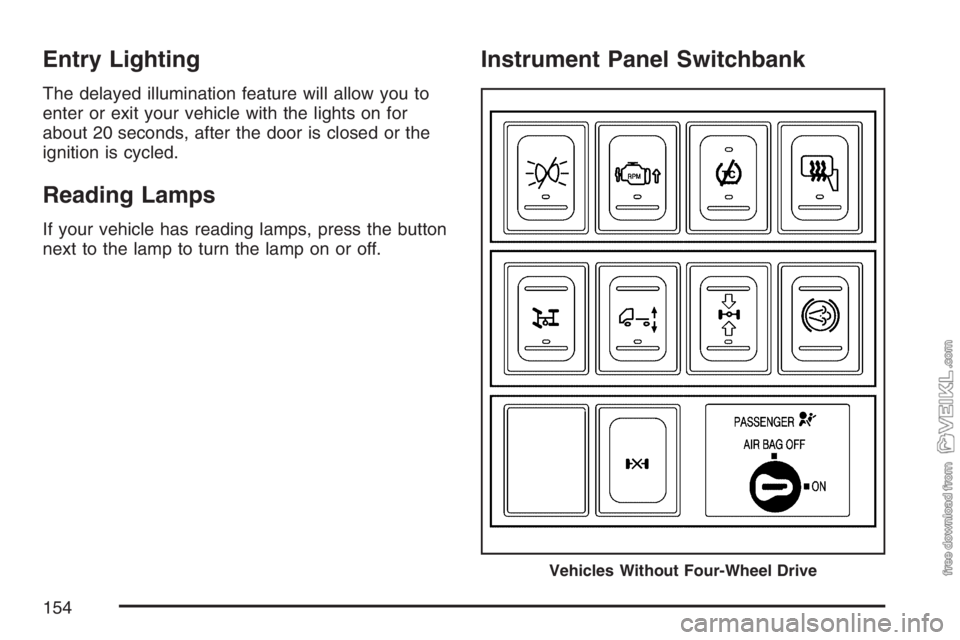
Entry Lighting
The delayed illumination feature will allow you to
enter or exit your vehicle with the lights on for
about 20 seconds, after the door is closed or the
ignition is cycled.
Reading Lamps
If your vehicle has reading lamps, press the button
next to the lamp to turn the lamp on or off.
Instrument Panel Switchbank
Vehicles Without Four-Wheel Drive
154
Page 155 of 430
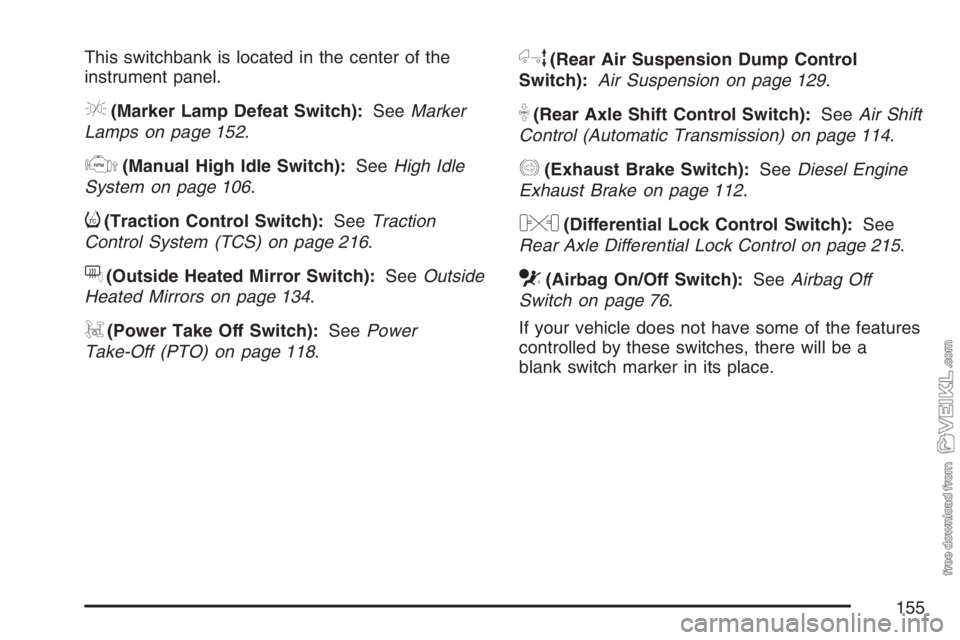
This switchbank is located in the center of the
instrument panel.
e(Marker Lamp Defeat Switch):SeeMarker
Lamps on page 152.
j(Manual High Idle Switch):SeeHigh Idle
System on page 106.
i(Traction Control Switch):SeeTraction
Control System (TCS) on page 216.
f(Outside Heated Mirror Switch):SeeOutside
Heated Mirrors on page 134.
g(Power Take Off Switch):SeePower
Take-Off (PTO) on page 118.
h(Rear Air Suspension Dump Control
Switch):Air Suspension on page 129.
k(Rear Axle Shift Control Switch):SeeAir Shift
Control (Automatic Transmission) on page 114.
q(Exhaust Brake Switch):SeeDiesel Engine
Exhaust Brake on page 112.
l(Differential Lock Control Switch):See
Rear Axle Differential Lock Control on page 215.
c(Airbag On/Off Switch):SeeAirbag Off
Switch on page 76.
If your vehicle does not have some of the features
controlled by these switches, there will be a
blank switch marker in its place.
155
Page 156 of 430
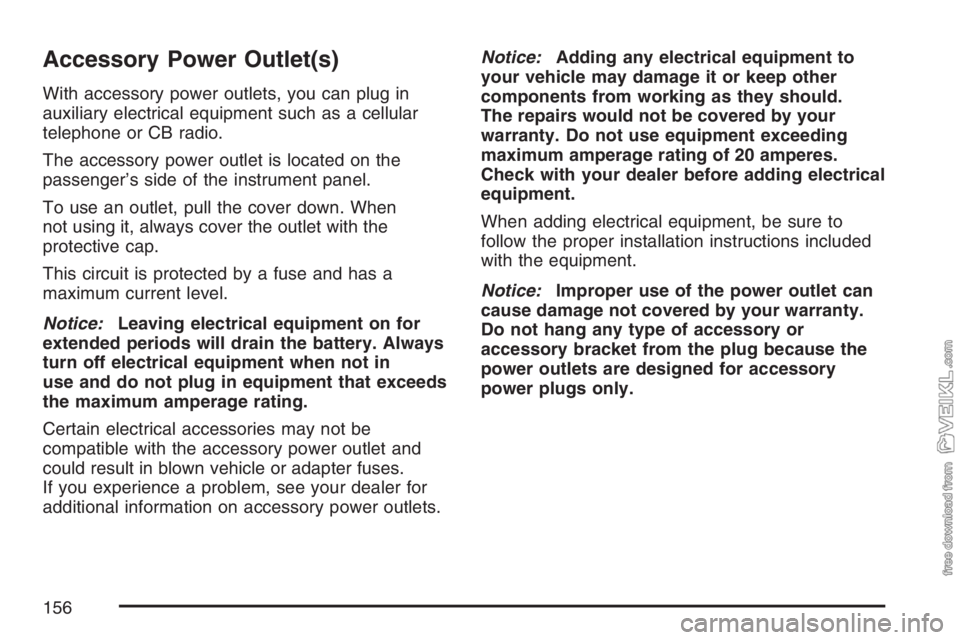
Accessory Power Outlet(s)
With accessory power outlets, you can plug in
auxiliary electrical equipment such as a cellular
telephone or CB radio.
The accessory power outlet is located on the
passenger’s side of the instrument panel.
To use an outlet, pull the cover down. When
not using it, always cover the outlet with the
protective cap.
This circuit is protected by a fuse and has a
maximum current level.
Notice:Leaving electrical equipment on for
extended periods will drain the battery. Always
turn off electrical equipment when not in
use and do not plug in equipment that exceeds
the maximum amperage rating.
Certain electrical accessories may not be
compatible with the accessory power outlet and
could result in blown vehicle or adapter fuses.
If you experience a problem, see your dealer for
additional information on accessory power outlets.Notice:Adding any electrical equipment to
your vehicle may damage it or keep other
components from working as they should.
The repairs would not be covered by your
warranty. Do not use equipment exceeding
maximum amperage rating of 20 amperes.
Check with your dealer before adding electrical
equipment.
When adding electrical equipment, be sure to
follow the proper installation instructions included
with the equipment.
Notice:Improper use of the power outlet can
cause damage not covered by your warranty.
Do not hang any type of accessory or
accessory bracket from the plug because the
power outlets are designed for accessory
power plugs only.
156
Page 157 of 430
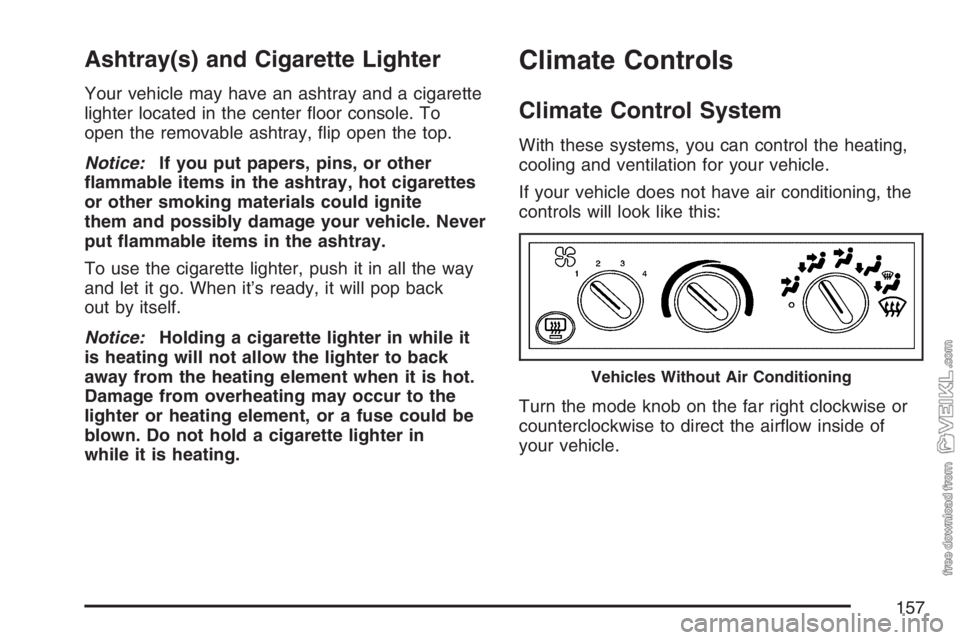
Ashtray(s) and Cigarette Lighter
Your vehicle may have an ashtray and a cigarette
lighter located in the center floor console. To
open the removable ashtray, flip open the top.
Notice:If you put papers, pins, or other
�ammable items in the ashtray, hot cigarettes
or other smoking materials could ignite
them and possibly damage your vehicle. Never
put �ammable items in the ashtray.
To use the cigarette lighter, push it in all the way
and let it go. When it’s ready, it will pop back
out by itself.
Notice:Holding a cigarette lighter in while it
is heating will not allow the lighter to back
away from the heating element when it is hot.
Damage from overheating may occur to the
lighter or heating element, or a fuse could be
blown. Do not hold a cigarette lighter in
while it is heating.
Climate Controls
Climate Control System
With these systems, you can control the heating,
cooling and ventilation for your vehicle.
If your vehicle does not have air conditioning, the
controls will look like this:
Turn the mode knob on the far right clockwise or
counterclockwise to direct the airflow inside of
your vehicle.
Vehicles Without Air Conditioning
157
Page 158 of 430
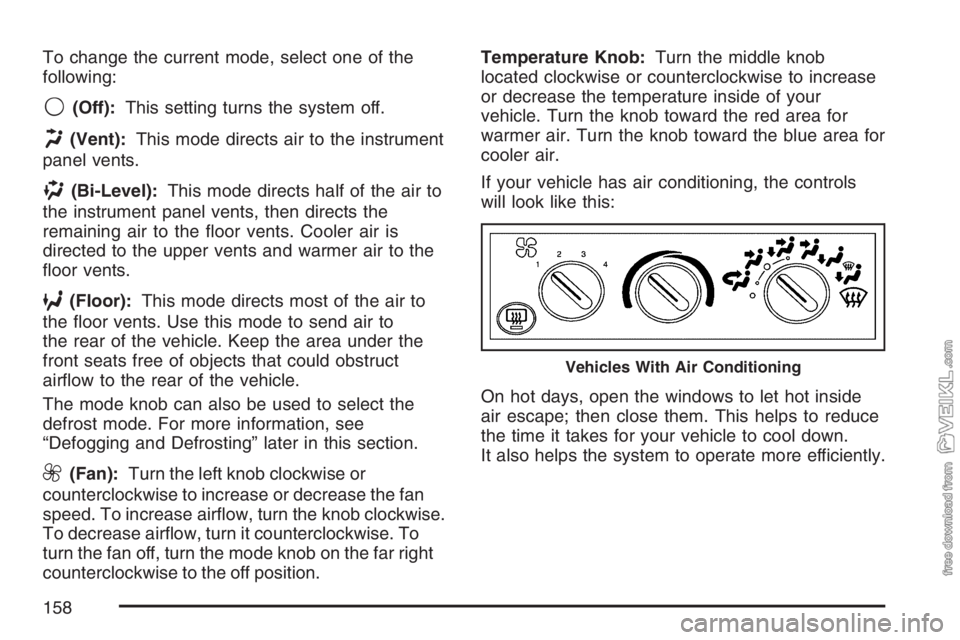
To change the current mode, select one of the
following:
9(Off):This setting turns the system off.
H(Vent):This mode directs air to the instrument
panel vents.
)(Bi-Level):This mode directs half of the air to
the instrument panel vents, then directs the
remaining air to the floor vents. Cooler air is
directed to the upper vents and warmer air to the
floor vents.
6(Floor):This mode directs most of the air to
the floor vents. Use this mode to send air to
the rear of the vehicle. Keep the area under the
front seats free of objects that could obstruct
airflow to the rear of the vehicle.
The mode knob can also be used to select the
defrost mode. For more information, see
“Defogging and Defrosting” later in this section.
9(Fan):Turn the left knob clockwise or
counterclockwise to increase or decrease the fan
speed. To increase airflow, turn the knob clockwise.
To decrease airflow, turn it counterclockwise. To
turn the fan off, turn the mode knob on the far right
counterclockwise to the off position.Temperature Knob:Turn the middle knob
located clockwise or counterclockwise to increase
or decrease the temperature inside of your
vehicle. Turn the knob toward the red area for
warmer air. Turn the knob toward the blue area for
cooler air.
If your vehicle has air conditioning, the controls
will look like this:
On hot days, open the windows to let hot inside
air escape; then close them. This helps to reduce
the time it takes for your vehicle to cool down.
It also helps the system to operate more efficiently.
Vehicles With Air Conditioning
158
Page 159 of 430
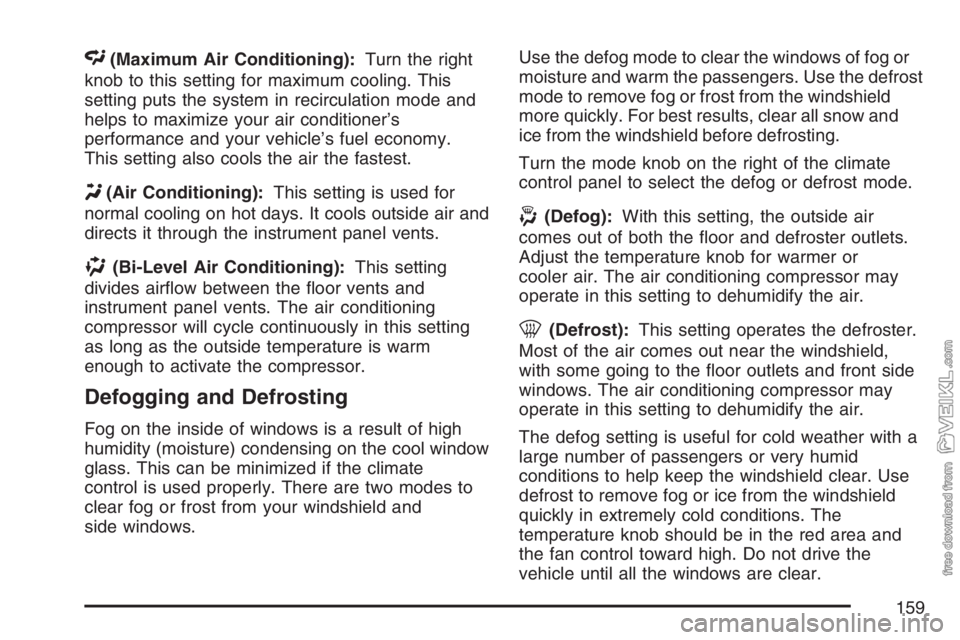
<(Maximum Air Conditioning):Turn the right
knob to this setting for maximum cooling. This
setting puts the system in recirculation mode and
helps to maximize your air conditioner’s
performance and your vehicle’s fuel economy.
This setting also cools the air the fastest.
Y(Air Conditioning):This setting is used for
normal cooling on hot days. It cools outside air and
directs it through the instrument panel vents.
)(Bi-Level Air Conditioning):This setting
divides airflow between the floor vents and
instrument panel vents. The air conditioning
compressor will cycle continuously in this setting
as long as the outside temperature is warm
enough to activate the compressor.
Defogging and Defrosting
Fog on the inside of windows is a result of high
humidity (moisture) condensing on the cool window
glass. This can be minimized if the climate
control is used properly. There are two modes to
clear fog or frost from your windshield and
side windows.Use the defog mode to clear the windows of fog or
moisture and warm the passengers. Use the defrost
mode to remove fog or frost from the windshield
more quickly. For best results, clear all snow and
ice from the windshield before defrosting.
Turn the mode knob on the right of the climate
control panel to select the defog or defrost mode.
-(Defog):With this setting, the outside air
comes out of both the floor and defroster outlets.
Adjust the temperature knob for warmer or
cooler air. The air conditioning compressor may
operate in this setting to dehumidify the air.
0(Defrost):This setting operates the defroster.
Most of the air comes out near the windshield,
with some going to the floor outlets and front side
windows. The air conditioning compressor may
operate in this setting to dehumidify the air.
The defog setting is useful for cold weather with a
large number of passengers or very humid
conditions to help keep the windshield clear. Use
defrost to remove fog or ice from the windshield
quickly in extremely cold conditions. The
temperature knob should be in the red area and
the fan control toward high. Do not drive the
vehicle until all the windows are clear.
159
Page 160 of 430
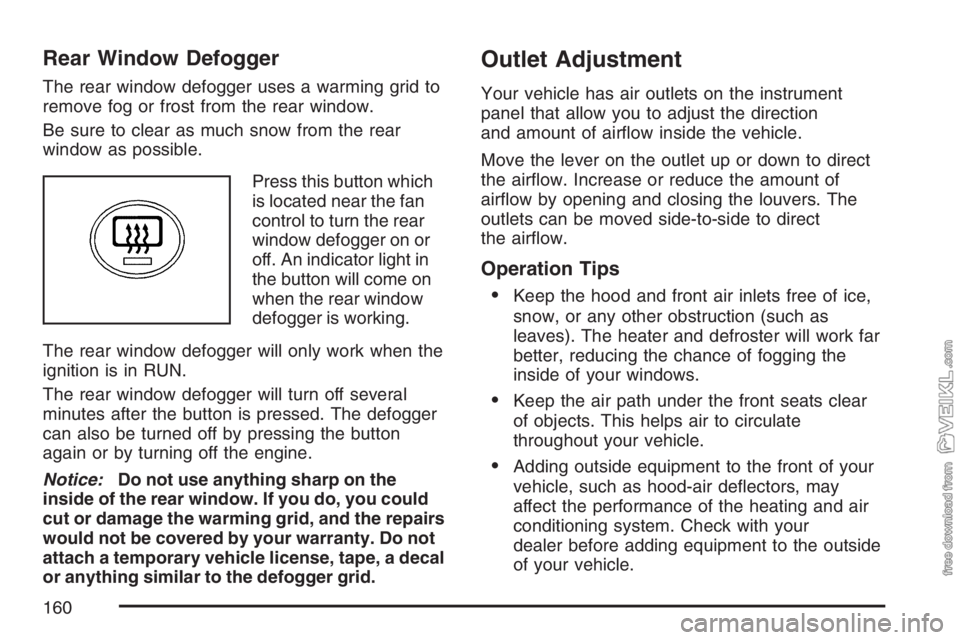
Rear Window Defogger
The rear window defogger uses a warming grid to
remove fog or frost from the rear window.
Be sure to clear as much snow from the rear
window as possible.
Press this button which
is located near the fan
control to turn the rear
window defogger on or
off. An indicator light in
the button will come on
when the rear window
defogger is working.
The rear window defogger will only work when the
ignition is in RUN.
The rear window defogger will turn off several
minutes after the button is pressed. The defogger
can also be turned off by pressing the button
again or by turning off the engine.
Notice:Do not use anything sharp on the
inside of the rear window. If you do, you could
cut or damage the warming grid, and the repairs
would not be covered by your warranty. Do not
attach a temporary vehicle license, tape, a decal
or anything similar to the defogger grid.
Outlet Adjustment
Your vehicle has air outlets on the instrument
panel that allow you to adjust the direction
and amount of airflow inside the vehicle.
Move the lever on the outlet up or down to direct
the airflow. Increase or reduce the amount of
airflow by opening and closing the louvers. The
outlets can be moved side-to-side to direct
the airflow.
Operation Tips
•
Keep the hood and front air inlets free of ice,
snow, or any other obstruction (such as
leaves). The heater and defroster will work far
better, reducing the chance of fogging the
inside of your windows.
•Keep the air path under the front seats clear
of objects. This helps air to circulate
throughout your vehicle.
•Adding outside equipment to the front of your
vehicle, such as hood-air deflectors, may
affect the performance of the heating and air
conditioning system. Check with your
dealer before adding equipment to the outside
of your vehicle.
160